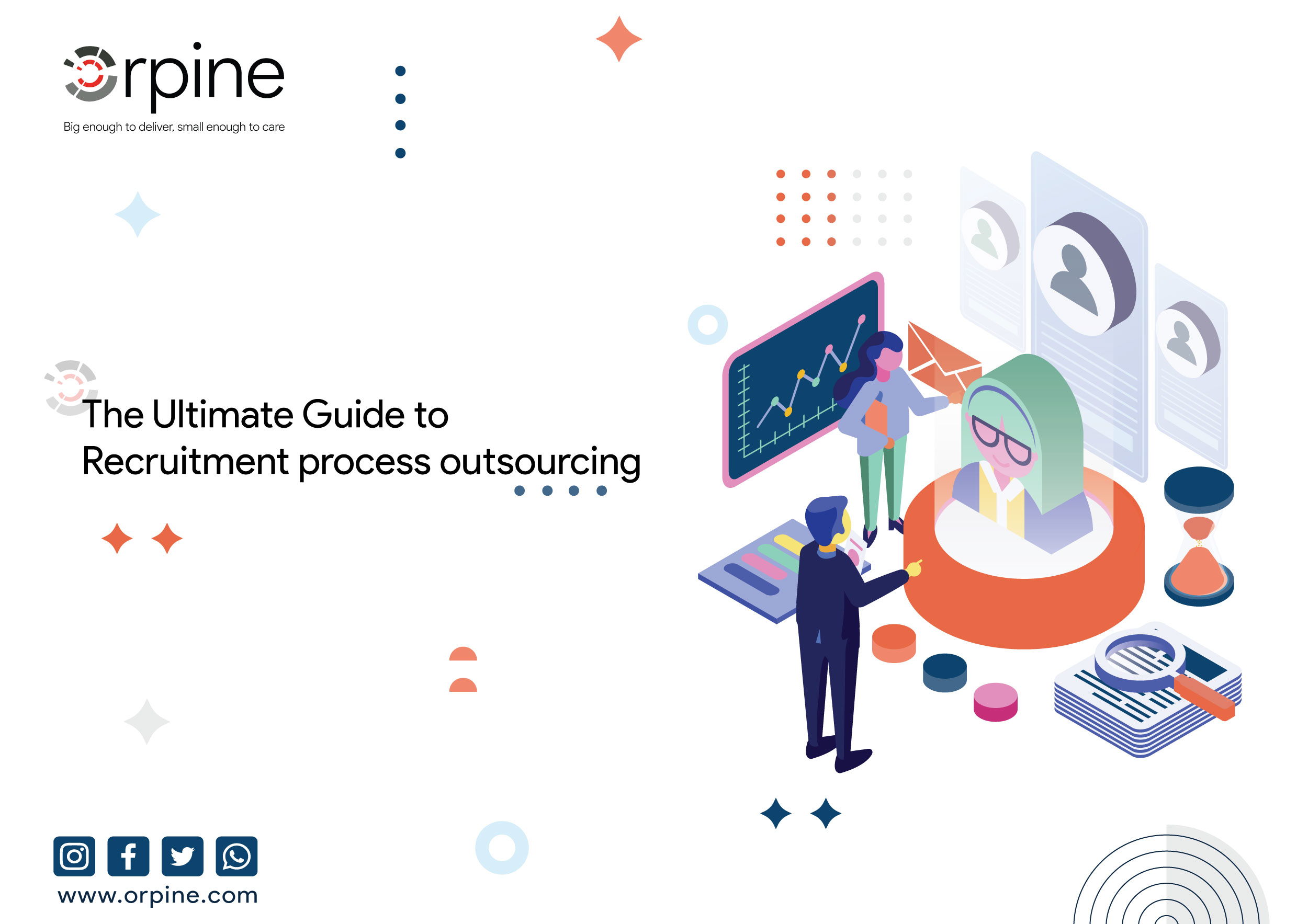
1. What is RPO (recruitment process outsourcing)?
Recruitment process outsourcing (RPO), employers shift responsibility for finding potential applicants to external service providers. The hiring process outsourcing method is a derivative of business process outsourcing (BPO) and is designed to bring qualified candidates to potential employers with minimal human resource involvement. Employers trying to fill vacancies can sign contracts with outsourcing companies for the hiring process and give them the responsibility to find, consider and evaluate suitable candidates.
Recruitment process outsourcing is primarily used by medium and large enterprises and is popular with employers looking for talent in their area of expertise or technology. In a tough job market where it’s difficult to attract potential new hires, RPOs can focus different perspectives, skills, and attention on issues while allowing HR professionals to focus on internal tasks.
2. Why RPO/ Benefits of RPO?
Outsourcing the hiring process is still new to many companies. Some people don’t know there is a way to outsource or improve the hiring process, while others stick to other solutions because they always do that and their bosses like to do things. However, if you’re serious about RPOs and really want to know what they bring to your business, here are six major reasons to outsource the hiring process.
- Reducing Recruitment Costs
High cost is one of the biggest reasons companies choose RPO solutions and one of the biggest benefits of RPO. Other companies are just wasting their time on long hiring processes and outdated (or missing) technologies. RPO providers can reduce hiring costs by streamlining the hiring process and showing them how to better find good candidates in less time and money. - Scalable Hiring model
As your company expands or opens new departments, you’ll need more staff, but not in the case of headcount reductions or hiring freezes. The RPO provider has a structure to adapt to any situation. You can grow or shrink your hiring team as needed. At the end of the day, customers pay for what they get. I have successfully filled my position. No more, no less. RPO providers are flexible and adaptable to any situation. Prices are based on closed positions. - Timely Hiring
In most cases, time can be a major challenge for hiring the right talent as it involves investing a lot of time sourcing the candidate, conducting the interviews, shortlisting, verifications, and offer release. The internal RPO resource model can be extended to meet the challenges of tight recruitment deadlines. - Talent Sourcing
Unless you are an established brand with great reach worldwide, your job listings are unlikely to appear on the radar of the most qualified candidates. The local community can only get you for now. According to Glassdoor’s 2020 survey report, 76% of HR managers say that attracting the best talent is their number one hiring challenge. As technology continues to lower geographical barriers, the need for time is to extend your reach to an extensive talent pool. - Enhanced Employment Brand
The Employment Brand is essentially the company’s identity as an employer, and when all other aspects of the hiring process are in place and successful, the Employment Brand will improve. If the quality of your candidate improves, it will only look good to other potential candidates in your company. If your recruitment manager is happy and works in a consistent recruitment process, people who go through this process can only say good things about your company and your company as an employer. Overall, RPOs help companies in a variety of ways, as well as reduce hiring costs and fill positions faster. RPOs actually help businesses become better workplaces. - Reduces the Need for Direct Advertising
Advertising is expensive. When companies work with RPO providers, these costs are significantly reduced. You don’t have to advertise at every regular expensive retailer. The RPO company is responsible for searching for candidates. They don’t come to you, they go to them. You have all the resources you need to keep track of the strongest people available.
3. RPO Stages in the recruitment process
- Identifying and understanding the Client/ Hiring need
Whether your job listing is new or vacant, you can’t find what you need without knowing what you need. Therefore, the hiring process should begin by identifying vacancies and then analyzing the job description, such as the knowledge, skills, and experience required for the job. - Preparing the JD
Once you have the exact knowledge, skills, and experience you need, define the roles and responsibilities of that position. Creating a Comprehensive Job Description (JD) helps you know what your prospects need to bring to meet your job requirements. More importantly, prospects are provided with a checklist or list for comparison before applying. This is a tool to make sure you’re getting your application from the right candidates (hopefully). - Talent Search
The most important aspect of the hiring process is identifying, attracting, and motivating the right people to apply for. Job listings need to be promoted internally to generate referrals and externally on popular social networking sites and priority job boards. RPO can help cast a wider web by holding job listings and posting classified ads in industry-leading publications. - Screening and shortlisting
To advance the hiring process, applicants need to be efficiently and accurately selected and placed on the candidate list. This is where the hiring process becomes difficult and difficult. Recruiting agencies will have an expert to handpick candidates who are rightfully qualified for the desired role. - Technical and personal interview
Selected applications will now go through the application process before receiving a proposal or rejection notice. RPO can help you plan and schedule multiple interviews seamlessly for each candidate, depending on the size of your hiring team and your individual hiring needs. - Evaluation and releasing the offer
This is the final stage of the recruitment process. Do not assume that the candidate will accept your offer. However, when RPO is placed they’ll do their part to make the candidate join the organization. if the candidate has patiently completed all the paperwork and is waiting for the selection process, it is more likely to accept the offer.
4. RPO for Small-mid sized Companies
There are many business applications, processes, and services available to support the growth of businesses of all sizes. Unfortunately, the myth remains that SMEs cannot take advantage of or take advantage of these benefits. Sure, some of them are too expensive to limit the customer base to high-end companies, but it’s a minority. SMEs can and must take advantage of all the possible benefits they can get.
One of these benefits is RPO. This ranges from recruitment recommendations to the complete recruitment process. You can provide your own staff or work with staff and existing processes to hire the best candidates for each vacant seat.
RPOs do everything to streamline the process, make it faster and more effective, and at the same time attract the most qualified candidates who are most likely to be satisfied in a particular position. Sure, hiring an RPO means paying an ongoing fee, but in most cases, the fee is lower than the cost of doing it all yourself.
5. RPO for MNCs
Over the years, RPOs have evolved into bespoke services that recognize that hiring is not a panacea. Small businesses can benefit from RPOs just like mid-sized, but what about large businesses? These companies often struggle during periods of rapid growth and need to scale down late. In addition, they are competing with large companies that have already established brands and optimized recruitment processes. MNCs benefit greatly from partnering with RPO providers. RPO providers can develop strategies tailored to their employment needs and adapt to future success.
6. RPO for Executive search
Use a network of a professional agency to properly contact potential executives for the highest-ranked jobs.
Executive search no longer has to be a long, one-month process. Recruitment agencies can understand the importance of speed and can find the right executive for you with world-class executive recruitment solutions. RPO gives you access to executives who have the perfect balance of expertise and experience.
7. RPO for offshoring
Outsourcing or offshore recruitment services for the recruitment process have been around for some time. There are various evaluations of the success and failure of RPOs. RPO failure involves many misunderstandings and inadequate communication to achieve the ultimate goal. Success at an RPO involves as important a hiring process as hiring team members on land. RPO is a bespoke service, not a panacea.
8. How to Choose an RPO provider for your business
Choosing the Right Recruiting Process Outsourcing (RPO) Provider is critical to the success of your outsourced recruitment or sourcing program. Whether you improve your recruitment process, efficiency, or HR brand, developing a partnership with an RPO provider begins with a selection process.
One must consider the following factors before choosing the PRO provider:
Experience:
Cost:
Reputation:
Hiring Process:
Hiring timelines:
RPO Implementation:
Success Stories:
Do your research and remember that the quality of your RPO provider is directly related to the quality of the people you refer to your company. Find a partner that isn’t driven by technology alone. While automation is quickly becoming a rule, humanized conversations can provide valuable insights into candidates’ experience and unique skills, as well as how to grow their business with the right talents.




